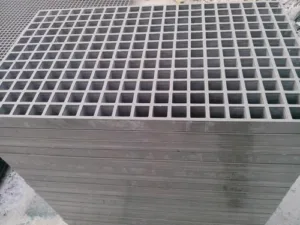In the realm of industrial and commercial flooring solutions, choosing the right grating material is essential. Fiberglass Mesh Grating and Steel Grating are two popular options, each with its own set of advantages and considerations. In this article, Unicomposite composite profiles will delve into the attributes of both fiberglass and steel gratings, helping you make an informed decision that aligns with your specific requirements.

fiberglass mesh grating
Introduction
When it comes to industrial and commercial flooring, both fiberglass mesh grating and steel grating offer unique benefits and advantages. Deciding between the two requires an understanding of their respective characteristics and how they align with your specific needs.
Understanding Fiberglass Mesh Grating
Composition and Properties Fiberglass mesh grating is composed of reinforced fiberglass plastic, offering remarkable strength-to-weight ratio and impressive resistance to corrosion and chemicals. This grating material is created by weaving glass fibers into a matrix, resulting in a sturdy yet lightweight structure.
Benefits of Fiberglass Mesh Grating
- Corrosion Resistance: Fiberglass grating is virtually immune to corrosion, making it ideal for harsh environments and exposure to chemicals.
- Lightweight: Its low weight simplifies installation and reduces the need for heavy equipment.
- Non-Conductive: Fiberglass does not conduct electricity, making it a safe choice for electrical and high-voltage environments.
- Low Maintenance: Minimal upkeep is required due to its resistance to rust, weathering, and chemicals.
- Slip Resistance: The textured surface enhances slip resistance, ensuring safety even in wet conditions.
Exploring Steel Grating
Composition and Properties Steel grating is crafted from welded or press-locked steel panels, providing substantial strength and durability. Its rigid structure makes it a dependable choice for heavy-load applications.
Advantages of Steel Grating
- High Load Capacity: Steel grating is known for its exceptional load-bearing capability, making it suitable for areas with heavy equipment and foot traffic.
- Durability: Its sturdy composition ensures a long lifespan, even in demanding conditions.
- Fire Resistance: Steel grating offers inherent fire resistance, a crucial factor in industrial settings.
- Cost-Effectiveness: Initial investment in steel grating can be lower than other options, especially for smaller areas.
- Versatility: Available in various sizes and configurations to accommodate different needs.
Comparing Performance
Load Bearing Capacity Both materials exhibit strong load-bearing capacities, but steel grating holds an edge in heavy-load scenarios due to its inherent strength.
Corrosion Resistance Fiberglass grating surpasses steel in terms of corrosion resistance, making it ideal for environments where exposure to chemicals or saltwater is common.
Maintenance Fiberglass requires less maintenance due to its corrosion resistance, while steel may require more attention to prevent rust.
Cost-effectiveness While steel grating may have a lower initial cost, fiberglass’s longer lifespan and reduced maintenance costs can make it more cost-effective in the long run.
Application Areas
Industrial Sector Both materials find use in industrial settings, with steel grating excelling in heavy-duty applications, while fiberglass is favored in corrosive environments.
Commercial Spaces Fiberglass grating’s aesthetic appeal and durability make it suitable for commercial areas, while steel grating is preferred for high-traffic regions.
Marine Environments Fiberglass’s resistance to saltwater corrosion makes it a top choice for marine applications.
Construction Sites Steel grating’s load-bearing capacity is well-suited for construction sites with heavy machinery.
Environmental Considerations
Sustainability of Fiberglass Fiberglass can be more sustainable due to its corrosion resistance, potentially reducing the need for frequent replacements.
Recycling and Disposal Both materials can be recycled, but steel’s recycling infrastructure is more established.
Aesthetic Aspects
Design and Customization Fiberglass offers more design flexibility and color options, allowing for aesthetic customization.
Visual Appeal Fiberglass’s sleek appearance can enhance the visual appeal of spaces, while steel has a more industrial look.
Installation and Handling
Weight and Ease of Installation Fiberglass’s lightweight nature simplifies installation, whereas steel requires more effort due to its weight.
Installation Methods Both materials have various installation methods, with steel grating requiring welding or bolting and fiberglass using clips or connectors.
Longevity and Durability
Lifespan of Fiberglass Grating Fiberglass’s resistance to corrosion and chemicals contributes to its long lifespan.
Lifespan of Steel Grating Steel’s durability grants it a long lifespan as well, though it might require more maintenance.
Safety Features
Slip Resistance Both materials offer good slip resistance, with fiberglass having a slight edge due to its textured surface.
Fire Resistance Steel’s fire resistance is a significant safety feature in industrial applications.
Maintenance Comparison
Cleaning and Upkeep Fiberglass’s resistance to corrosion and weathering leads to lower maintenance requirements compared to steel.
Cost Analysis
Initial Investment Steel grating often has a lower initial cost, but long-term costs can be higher due to maintenance needs.
Choosing the Right Grating
Considering Your Needs Determine your specific needs, load requirements, and environmental conditions before making a decision.
Consulting with Experts Engage with professionals who can provide guidance tailored to your situation.
Conclusion
In the choice between fiberglass mesh grating and steel grating, there’s no definitive answer—each material excels in different scenarios. Assess your project’s demands, load requirements, and environmental factors to make the best choice for your needs. Whether you prioritize corrosion resistance, load capacity, or aesthetic appeal, both fiberglass and steel gratings offer valuable attributes for various applications.
FAQs
- Which grating material is better for corrosive environments? Fiberglass mesh grating is highly recommended for its superior corrosion resistance.
- Is steel grating suitable for marine applications? Yes, steel grating’s durability and load-bearing capacity make it suitable for marine environments.
- What is the primary advantage of fiberglass grating? Fiberglass grating is lightweight, corrosion-resistant, and requires minimal maintenance.
- Does fiberglass grating require painting for protection? No, fiberglass grating does not require painting as it is inherently resistant to corrosion.
- Is the initial cost of steel grating significantly lower than fiberglass? Yes, steel grating often has a lower initial cost, but consider long-term maintenance expenses as well.




























